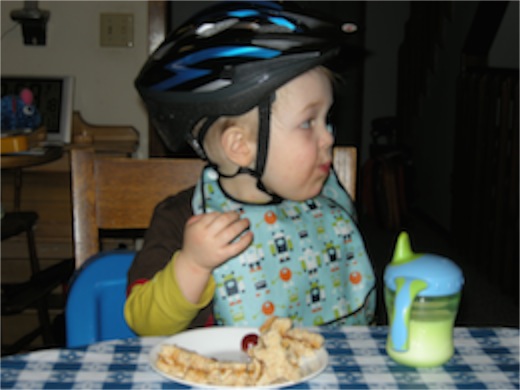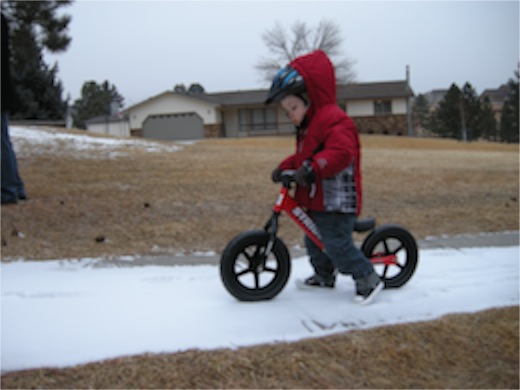Being present
22/02/13 05:34
Buddhists have a term that speaks of a particular quality of awareness and focus. They call it the practice of “mindfulness.” I’ve read books and articles by spiritual leaders who speak of a state of deep awareness of the world – of being able to focus one’s attention on the present and on what is really going on here and now. The Vietnamese Zen Buddhist monk Tich Nhat Hanh has written a small book on the practice called “The Miracle of Mindfulness.” I’ve also read other books about the practice of meditation that speak of the concept. I think that there is a bit of a problem in language translation with the use of the term mindfulness. Because in Western culture we think of the mind as separate from emotions. The use of the term “mind” implies intellectual activity. While thinking is an important part of meditation, there is more to being truly present than just thinking the right thoughts.
Jon Kabat-Zinn, a professor at the University of Massachusetts Medical School and author of scientific papers on the use of mindfulness in medical practice, has written extensively on the use of mindfulness as a technique for stress reduction and as a treatment for depression. His careful analysis of the relationship of mind, boy and emotion has been helpful for me in understanding meditation as a deeper practice than just thinking.
I have been enjoying a lesson in mindfulness this week with the visit of our two-year-old grandson. I am intrigued by watching him, wondering about how he thinks, and observing what he has to teach me about life.
 One thing about a two-year old, is his incredible ability to focus. When he wants to, he can pay attention to a single object or idea and keep his attention focused on that item even when the world around him is hectic and filled with distraction. For a couple of days he has been working on learning to ride a strider. The small device is a bicycle without pedals. You sit astride it on a small seat and push it with your feet on the ground. The device is designed to teach balance and confidence while simply being fun. Striders are the invention of a Rapid City man and are made here in Rapid City, so it seemed natural to us to take our grandson to the company and let him pick out one for himself. He calls it “my bike” and it seems to capture his attention during many of his waking hours.
One thing about a two-year old, is his incredible ability to focus. When he wants to, he can pay attention to a single object or idea and keep his attention focused on that item even when the world around him is hectic and filled with distraction. For a couple of days he has been working on learning to ride a strider. The small device is a bicycle without pedals. You sit astride it on a small seat and push it with your feet on the ground. The device is designed to teach balance and confidence while simply being fun. Striders are the invention of a Rapid City man and are made here in Rapid City, so it seemed natural to us to take our grandson to the company and let him pick out one for himself. He calls it “my bike” and it seems to capture his attention during many of his waking hours.
He is not bothered by the fact that our house is too small for riding bikes indoors. He is not bothered by the fact that the weather outside is chilly and there is a dusting of new snow on the ground. He is completely at home in his surroundings. He finds ways to sit on his strider, to push it around our house and to find real joy in playing with it in the place where he is. He doesn’t spend any energy thinking about warmer days or different places or some other time. He is simply present in the moment.
 Yesterday he was so focused on the strider that he ate with his bicycle helmet on his head. In his world it wasn’t worth the time to take the helmet off. The food was almost an aside to the more important business of riding his bike. In the afternoon we went outside to a small playground area in our subdivision so that he had a slightly more level and open place to ride. The walks hadn’t been cleared, so there was snow and ice on the concrete. That just added to his sense of adventure. He went right on enjoying the strider.
Yesterday he was so focused on the strider that he ate with his bicycle helmet on his head. In his world it wasn’t worth the time to take the helmet off. The food was almost an aside to the more important business of riding his bike. In the afternoon we went outside to a small playground area in our subdivision so that he had a slightly more level and open place to ride. The walks hadn’t been cleared, so there was snow and ice on the concrete. That just added to his sense of adventure. He went right on enjoying the strider.
Of course the strider isn’t the only thing in his world. He still plays with other toys, gives and receives cuddles from parents and grandparents, enjoys having books read to him, takes a bath, eats his meals, has naps and gets on with his life. But there is a capacity to focus his attention that seems to be missing from our usually-distracted adult lives. We adults seem to be continually connected to the outside world with our computers and phones and other networked devices. Too often we think that what is most real and most important is the world of work, tasks to be accomplished, a living to be earned, a mark to make on the world. Our grandson doesn’t worry about any of that. And he invites us to come into his world and just be present.
 His gift is truly wonderful. Too often I think I am too busy to just sit on the carpet and watch a small car roll back and forth. Too often I think that there are things that are more important than just watching the cat play with a ball of yarn. The world in which I live is filled with all kinds of delight that I simply allow to pass without taking note of what is going on. Our grandson invites me to slow down and take a look at what is happening. It is as if he is saying, “Grandpa, don’t think about what is going on somewhere else, just be with me here and now.”
His gift is truly wonderful. Too often I think I am too busy to just sit on the carpet and watch a small car roll back and forth. Too often I think that there are things that are more important than just watching the cat play with a ball of yarn. The world in which I live is filled with all kinds of delight that I simply allow to pass without taking note of what is going on. Our grandson invites me to slow down and take a look at what is happening. It is as if he is saying, “Grandpa, don’t think about what is going on somewhere else, just be with me here and now.”
What he teaches is an essential skill to the work I do. When I sit with a person who has just received a life-altering medical diagnosis, I need to simply be present with that person. Distractions of phone or e-mail or thoughts of undone work get in the way of making connections. When I pay a visit in a nursing home, my job is to be truly present with the person I’m visiting. Just being present is a gift that a minister can offer to those we are called to serve. And it may be more important than the words we say.
Being alive to the present moment is not a new idea. People have been trying to hone the skill of presentness for millennia. It may be one of those things at which we were better when we were children. It may be one of those things that we can learn from the children in our lives.
How fortunate I am for the gift of the presentness of a grandson.
Jon Kabat-Zinn, a professor at the University of Massachusetts Medical School and author of scientific papers on the use of mindfulness in medical practice, has written extensively on the use of mindfulness as a technique for stress reduction and as a treatment for depression. His careful analysis of the relationship of mind, boy and emotion has been helpful for me in understanding meditation as a deeper practice than just thinking.
I have been enjoying a lesson in mindfulness this week with the visit of our two-year-old grandson. I am intrigued by watching him, wondering about how he thinks, and observing what he has to teach me about life.

He is not bothered by the fact that our house is too small for riding bikes indoors. He is not bothered by the fact that the weather outside is chilly and there is a dusting of new snow on the ground. He is completely at home in his surroundings. He finds ways to sit on his strider, to push it around our house and to find real joy in playing with it in the place where he is. He doesn’t spend any energy thinking about warmer days or different places or some other time. He is simply present in the moment.

Of course the strider isn’t the only thing in his world. He still plays with other toys, gives and receives cuddles from parents and grandparents, enjoys having books read to him, takes a bath, eats his meals, has naps and gets on with his life. But there is a capacity to focus his attention that seems to be missing from our usually-distracted adult lives. We adults seem to be continually connected to the outside world with our computers and phones and other networked devices. Too often we think that what is most real and most important is the world of work, tasks to be accomplished, a living to be earned, a mark to make on the world. Our grandson doesn’t worry about any of that. And he invites us to come into his world and just be present.

What he teaches is an essential skill to the work I do. When I sit with a person who has just received a life-altering medical diagnosis, I need to simply be present with that person. Distractions of phone or e-mail or thoughts of undone work get in the way of making connections. When I pay a visit in a nursing home, my job is to be truly present with the person I’m visiting. Just being present is a gift that a minister can offer to those we are called to serve. And it may be more important than the words we say.
Being alive to the present moment is not a new idea. People have been trying to hone the skill of presentness for millennia. It may be one of those things at which we were better when we were children. It may be one of those things that we can learn from the children in our lives.
How fortunate I am for the gift of the presentness of a grandson.